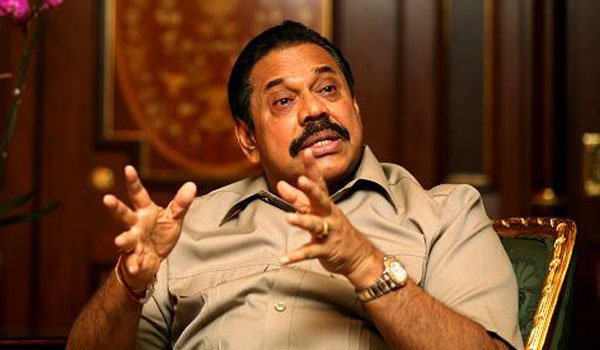History is not kind to those who seek a second innings in electoral politics after defeat. Neither Winston Churchill, as the U.K.'s Prime Minister in the early 1950s, nor Indira Gandhi, as India’s Prime Minister in the 1980s, had a glorious second spell. Yet, former Sri Lankan President Mahinda Rajapaksa, who has decided to contest in the next month’s Parliamentary elections, is making a determined bid to succeed where the other two leaders could not.
In Sri Lanka, none of his predecessors contested in the Parliamentary elections and returned to Parliament, after completing their terms as President. If Mr. Rajapaksa succeeds, he can claim to have laid a new path. Despite the present President Maithripala Sirisena’s protestations, the former President has now become the de facto candidate of the Sri Lanka Freedom Party (SLFP)-led United People’s Freedom Alliance (UPFA) for the post of Prime Minister.
With the way Mr. Rajapaksa got tickets for himself and most of his supporters, he has shown who is the “boss,” even though Mr. Sirisena is technically the chief of the SLFP and the UPFA. He has virtually reversed what happened six months ago after his stunning defeat to his low-profile and colleague-turned-critic Sirisena in the presidential poll. The SLFP and the Alliance are back under Mr. Rajapaksa’s control. Sri Lankan media were soon speculating that Mr. Sirisena — “Maithri” as he is popularly called — has no taste for the rough and tumble of politics.
However, in a speech last week explaining his position, the President demonstrated that he too could pack a punch however “weak” he may be. He succeeded in presenting a negative portrayal of his predecessor and explained how Mr. Rajapaksa attempted to return to power. He went one step further, by declaring that even if the UPFA were to get a majority, he would not make his predecessor the Prime Minister.
It is no wonder that the 76-year-old Vasudeva Nanayakkara, a Leftist and a prominent figure of the “bring back Mahinda [Rajapaksa]” campaign, calls Mr. Sirisena’s statement “very hostile.” Contrary to his view, the statement was viewed as “extremely favourable” to the United National Party (UNP), if one were to quote the UNP’s senior leader Lakshman Kiriella.
In that famous speech, the President convincingly articulated his views why he chose to accept the presidency of the SLFP despite winning the January election with the support of a host of political parties and civil society groups, numbering 49. Among those who had backed his candidacy were the UNP, Tamil National Alliance (TNA), Sri Lanka Muslim Congress (SLMC), Janatha Vimukthi Peramuna (JVP), Democratic Party (led by Sarath Fonseka, now the country’s first Field Marshal), and the Jathika Hela Urumaya (JHU) of Patali Champika Ranawaka.
In the President’s assessment, had Mr. Rajapaksa remained as the party chief, the 19th Constitutional Amendment, envisaging the dilution of powers of the Executive Presidency, and many other measures would not have become a reality. Through this speech, Mr. Sirisena has been able to arrest the trend of adverse perception gaining ground against him in the wake of his silence over reports of Mr. Rajapaksa’s nomination in the early part of this month. He is also said to have approved an electoral tie up between the UNP and a breakaway group of the SLFP, led by Rajitha Senaratne, who was with Mr. Sirisena when the latter quit the Rajapaksa regime in November last year. Arjuna Ranatunga, a colleague of Dr. Senaratne and formerly an iconic captain of the Sri Lankan cricket team, has cited the “total support” of former President Chandrika Bandaranaike Kumaratunga too for the partnership with the UNP.
The UNP, which has also roped in the JHU under its fold, is now heading a front — United National Front for Good Governance (UNFGG). Many parties, representing Tamils and Muslims, have also rallied behind the UNP and they include the SLMC, All Ceylon Makkal Congress and the newly-formed Tamil Progressive Alliance, which consists of three parties of Indian Tamils. However, one of oldest parties in the country, the Ceylon Workers’ Congress of S.A.R. Thondaman, has remained loyal to Mr. Rajapaksa. It is facing the electorate as part of the UPFA in Nuwara Eliya, Ratnapura and Matale districts even though it is contesting alone in Uva and Kandy.
As expected, the TNA is going it alone in the Northern and Eastern Provinces. Its goal is to net 20 seats out of a total of 29 seats, which include what has been allocated under the National List for the provinces. Sensing the popular mood against Mr. Rajapaksa in the region, Douglas Devananda of the Eelam People's Democratic Party (EPDP), another ally of the former President, is contesting separately in the two provinces this time.
So far, none of the principal formations — the UPFA and the UNFGG — have articulated elaborately on the vexatious Tamil question. In a chat with The Hindu recently, UNP leader and Prime Minister Ranil Wickremesinghe indicated that the concept of good governance encompassed decentralisation and devolution of power. In the last six months, the Sirisena-Wickremesinghe combine has taken some steps with the aim of assuaging the sentiments of Tamils. Mr. Rajapaksa, who has been accusing the government of enabling the “likely re-emergence” of the Liberation Tigers of Tamil Eelam, is also sounding conciliatory to the minorities, who solidly backed Mr. Sirisena six months ago.
Many impressive proposals such as electoral reforms and the law on right to information, forming part of the 100-day-programme of Mr. Sirisena, could not be taken to their logical end in all these months. Now, they all depend on the people’s verdict on August 17.

- T. Ramakrishnan
(thehindu.com)






